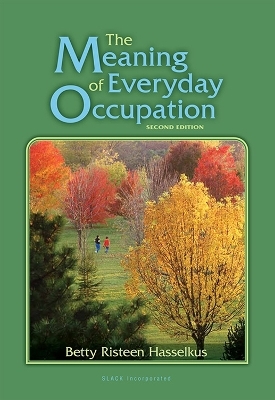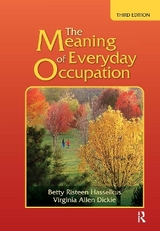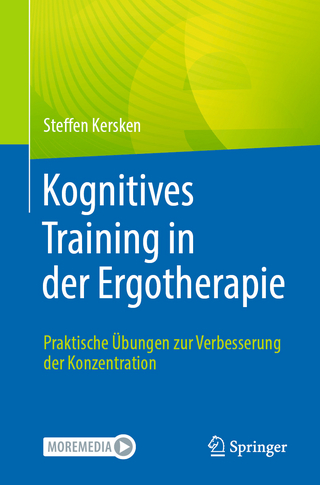
The Meaning of Everyday Occupation
SLACK Incorporated (Verlag)
978-1-55642-934-7 (ISBN)
- Titel erscheint in neuer Auflage
- Artikel merken
The Meaning of Everyday Occupation, Second Edition is a text designed to bring the reader closer to the world of occupation. This new edition probes more deeply into the meanings of everyday occupation and offers opportunities to the reader for personal reflection about day-to-day occupational patterns.
The continuing emphasis of this Second Edition, by award-winning author Betty Risteen Hasselkus, PhD, is on everyday occupation as experience. The Meaning of Everyday Occupation motivates occupational therapists to think about how occupation is experienced in everyday life, to absorb the complexity of meanings imbedded in daily life, and to value the personal and social significance of everyday occupation in their own and their clients’ lives.
Chapters themes include:
Space and place—sources of meaning in occupation
Culture and occupation
Occupation as a source of well-being and development
Occupation and relationships
Disability and occupation
Occupation as a source of spirituality
Creativity in occupation as a source of meaning
Throughout the Second Edition, the text focuses on the ways in which daily occupation contributes to meaning in our lives, providing a sound understanding of the daily routines and activities to which we so often give little attention. Emerging trends in occupational therapy are also examined, focusing on strengthened globalization, the movement toward populations and systems as clients, and the increasing emphasis on experiential definitions of occupation in education, practice and research.
Instructors in educational settings can visit www.efacultylounge.com for newly developed material to be used for teaching in the classroom.
The Meaning of Everyday Occupation, Second Edition is a unique and comprehensive text for the study of occupation and its implications for effective practice. Verbatim narratives from occupational therapists in practice and excerpts from the author’s life are integrated with theories of occupation and occupational science throughout the book, yielding a coherent, comprehensive and readable text on the importance of occupation to the quality of daily life.
Betty Risteen Hasselkus, PhD, OTR, FAOTA is an Emeritus Professor of Kinesiology/Occupational Therapy at the University of Wisconsin-Madison where she served as program director for 10 years. Prior to her faculty appointment, she earned a bachelor of science degree in occupational therapy, a master of science degree in physical education, and a doctor of philosophy degree at the University of Wisconsin. The hospital where she did much of her training and where she held her first position in occupational therapy is also the building where she was born, where her children were born, and where, ultimately, the academic program of occupational therapy was located during her faculty years. During her more than 40 years of active participation in the profession of occupational therapy, Dr. Hasselkus has focused her research, teaching, and practice on the everyday occupational experience of people in the community, with a special emphasis on family caregiving for older family members, physician-family caregiver relationships, meanings of everyday occupation to dementia daycare staff, and the meaning of doing occupational therapy. She was elected to the American Occupational Therapy Association Roster of Fellows in 1986 and to the American Occupational Therapy Foundation Academy of Research in 1999. Dr. Hasselkus was the invited Wilma West Lecturer at the University of Southern California in 2003, presenting a lecture entitled, "The Voice of Everyday Occupation." In 2005, she was awarded the AOTA Eleanor Clarke Slagle Lectureship Award-the Association's highest award for scholarship-and subsequently gave the award lecture in 2006, "The World of Everyday Occupation: Real People, Real Lives." Dr. Hasselkus was editor of The American Journal of Occupational Therapy from 1998 to 2003. Her international reputation as a scholar has taken her to Australia, Canada, Sweden, Denmark, Wales, and Northern Ireland, where she has provided lectures and workshops on qualitative research methods, critical analysis, writing, and qualitative research opportunities in everyday occupation. Her scholarly career includes more than 90 publications in journals and texts.
About the AuthorAcknowledgmentsIntroduction Chapter 1 Meaning: An Essential for Life Personal and Social Meanings Meaning and Performance in Life Aspects of Seeing How Do We “Know” Meaning? The Open Door Policy Chapter 2 Meaning in Everyday Occupation Happiness Is Occupation and Being Occupation and Becoming Occupation and Belonging Chapter 3 Space and Place: Sources of Meaning in Occupation Space and Place in Our Lives Health and Well-Being Within Space and Place Space and Therapy From Space to Place in Therapy Placelessness A Place to Call Home Special Places A Geography of Health Chapter 4 Culture and Occupation: The Experience of Similarity and Difference Culture as Similarity and Difference Cultivating the Similar in Our Lives Cultivating Difference in Our Lives Structuring the Similarities: Routines, Habits, and Rituals Disability as Difference Chapter 5 Occupation as a Source of Well-Being and Development The Essence of Well-Being Occupation and Human Development Occupation to the End Chapter 6 Occupation as Meaningful Connection Relation and the Professional Relation and Well-Being Occupational Forms of Relation Occupational Therapy and Connectedness Chapter 7 Disability and Occupation The Faces of Disability Occupation as Disability Experience Disability as Occupational Experience Being the Bridge Chapter 8 Occupation as a Source of Spirituality This Thing Called Spirituality Spiritual “Health” Spirituality and Occupation: Compatible Partners? Spirituality and Everyday Occupation Spirituality and Occupational Therapy The Space Within Chapter 9 Creativity in Occupation as a Source of Meaning Creativity From Without and Within Arising From Chaos Creativity and Health To the Dancing Star Chapter 10 Occupation Speaks: Final Thoughts The Therapist and the Splint Index
| Sprache | englisch |
|---|---|
| Maße | 178 x 254 mm |
| Gewicht | 683 g |
| Themenwelt | Medizin / Pharmazie ► Physiotherapie / Ergotherapie ► Ergotherapie |
| Sozialwissenschaften | |
| ISBN-10 | 1-55642-934-7 / 1556429347 |
| ISBN-13 | 978-1-55642-934-7 / 9781556429347 |
| Zustand | Neuware |
| Informationen gemäß Produktsicherheitsverordnung (GPSR) | |
| Haben Sie eine Frage zum Produkt? |
aus dem Bereich



